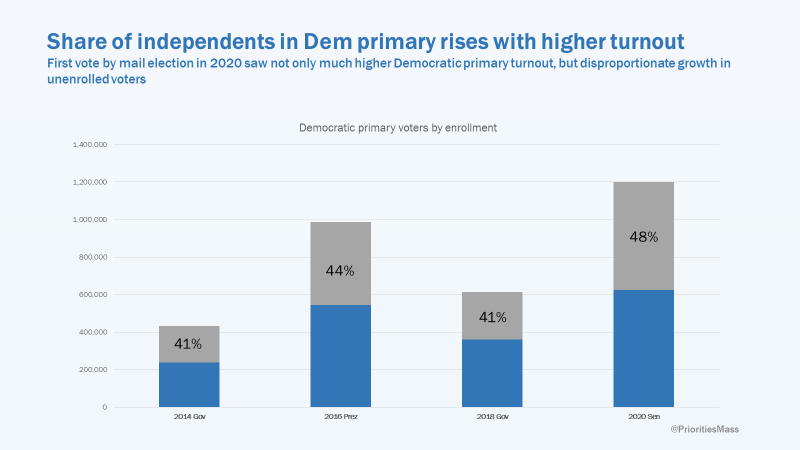Baker Out: Massachusetts is now a zero-party* state
The 2022 Democratic gubernatorial primary is now the general election - and its voters will be disproportionately moderate and a majority will be independent
In the end, he took what we laid out as the most likely path: Charlie Baker is retiring.
Baker’s popular brand of moderate Republican was not a new phenomenon in Massachusetts. But his inverse partisan popularity - overwhelmingly favorable among Democrats, and underwater with Republicans - surely was, and today’s announcement marks a new era for Massachusetts state politics: a general election in September.
There will be no competitive general elections in 2022, and maybe longer, barring significant changes or candidates bringing personal wealth or significant celebrity. Winning a Republican primary and a general election now require mutually exclusive traits in a candidate.
Voting changes and macro political trends are leading to potentially massive Democratic primary turnout as the vote-by-mail driven 2020 election saw turnout 54% higher than any other non-presidential primary since 1990.
The majority of voters in Democratic primary elections will be independents driven by a trio of factors: the share of independents has continued climbing, to 57%; higher turnout is correlated with more independents; the MassGOP implosion eliminates the only other option for independents.
Massachusetts is mostly* a zero-party state - but in a big asterisk, convention delegates loom large. It is tempting to declare Massachusetts a zero-party state with the Democratic primary serving entirely as a general election. But there is one hurdle to that: the party convention delegates, and the 15% support threshold required for to make the primary ballot.
The future of public policy in Massachusetts will now be driven by the reality of the Democratic primary electorate. 2022 presents a unique inflection point for shaping that future. To gauge that future we must know who the voters are - and there will be a lot of them.
Trend 1: Higher turnout -- 2020 Democratic primary turnout was massive
The Democratic primary for governor has not crossed the 1 million voter threshold since 1990, and only surpassed 771,000 once since then (2006). The Democratic primary for US Senate had not crossed the 1 million vote threshold dating back at least through 1970.
In 2020, the first vote-by-mail Democratic primary election, more than 1.4 million voted - and 64% did so by mail or early.
Trend 2: More independents in primary - 2020 was a leap for unenrolled share
Democratic voter registration was surpassed by independents (or ‘unenrolled’) voters in 1990. Independents are now 57% of registered voters, compared to 32% registered as Democrats, and the share of independents in Democratic primary elections is correlated with turnout.
The implosion of the state GOP will only add to these trends of time and turnout.
These early voting-driven votes are not evenly distributed, as a MassINC Polling Group analysis for WBUR found increases highly correlated with income and education. Similar to the challenges presented by off-cycle municipal elections, concentrating voter power in the primaries has a regressive effect. For example, in Adam Gomez’s Springfield-based state senate district, there were 23,000 voters in the 2020 primary. In Cindy Creem’s Newton and Brookline-based state senate district, there were 54,000 voters. Similar population, more than double the vote total - a disparity that is much greater than in the November general election.
MassGOP is weaker than any other state party in the country
Baker’s news comes the morning after a state Republican Party meeting that was canceled due to mismanagement. It is hard to overstate the futility of this group. From our last analysis:
What’s up with the MassGOP?
Of the two major parties in all 50 states, the Massachusetts Republican Party is the 2nd weakest in affiliation (27% of voters consider themselves as GOP or lean GOP - no other state GOP ranks lower; only Democrats in Wyoming are lonelier) and last in registration as of 2018 (among states where voters register, only Idaho’s Democrats were at 11%). As of 2020, fewer than 10% of Massachusetts voters were registered Republicans.
In short, the MassGOP ranks 99th out of 100 state parties.
But the MassGOP isn’t just exceptionally small - it is very Trumpy. And has been from the get-go: of the first 29 primaries in 2016, MassGOP voters gave Trump (49%) his best showing.
Meaning Alabama, Texas, Arkansas, and Oklahoma all went for Trump with less enthusiasm and vigor than your friends and neighbors here in the Commonwealth. Well, your neighbors anyway.
Markeyverse Myth
The meme teams drove a compelling narrative for the Senator’s resurgence, but the election results were clear: Eddie Markey won with the same voters who powered Stevie Lynch, Richie Neal, and multiple state legislators to victories over more ideological challengers (and their SuperPACs).
With no real GOP primary competing for centrist voters, expect the “Baker Democrat” to survive its namesake.
The 2022 Democratic primary electorate will be very large, mostly moderate - and decisive.




